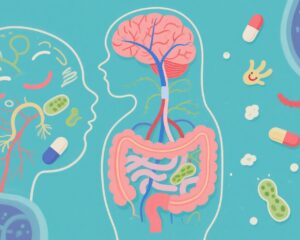Introduction
Depression is a complex mood disorder characterized by persistent feelings of sadness and loss of interest, often accompanied by physiological changes including inflammation. Recent advances have explored the gut-brain axis and the potential role of gut microbiota in modulating depressive symptoms. Probiotics, live microorganisms that may confer health benefits, have been investigated for their adjunctive antidepressant properties. However, despite promising preliminary data, robust clinical evidence remains scarce.
One proposed mechanism by which probiotics may exert antidepressant effects involves short-chain fatty acids (SCFAs)—neuroactive bacterial metabolites with known anti-inflammatory properties. This study aimed to evaluate whether adjunctive treatment with a Lactobacillus probiotic (specifically Limosilactobacillus reuteri) could improve depressive symptoms in patients experiencing systemic low-grade inflammation. Additionally, the study assessed correlations between treatment response and SCFAs in blood and feces.
Methods
This was an 8-week, double-blind, placebo-controlled randomized clinical trial (RCT) involving 75 patients diagnosed with major depressive disorder (MDD). Inclusion criteria included a body mass index (BMI) of 25 kg/m2 or higher and elevated high-sensitivity C-reactive protein (hs-CRP) ≥ 1 mg/L, indicating systemic low-grade inflammation.
Participants were randomized to receive either the probiotic supplement containing Limosilactobacillus reuteri or a placebo, both alongside their stable regular treatments. Primary outcome measures included changes in total scores on the Montgomery-Åsberg Depression Rating Scale (MADRS), a widely used tool for assessing depressive symptom severity. Inflammatory depressive symptoms were assessed through a composite score derived from specific Patient Health Questionnaire-9 (PHQ-9) items related to sleep disturbance, energy levels, and appetite.
Secondary outcomes evaluated anxiety symptoms, anhedonia (loss of pleasure), insomnia, fatigue, and gastrointestinal symptoms. Blood and fecal samples were collected before and after the intervention to analyze SCFA concentrations.
Results
The modified intention-to-treat analysis, including all patients with at least one post-baseline visit, showed no statistically significant differences between the probiotic and placebo groups in any primary or secondary outcomes (all p-values > 0.25). This indicates that adding L. reuteri to regular treatment did not produce an overall antidepressant effect in this patient population.
Notably, fecal formic acid levels were lower at baseline in patients who responded better to treatment and increased more significantly during the intervention in the probiotic group. This change correlated with a reduction in MADRS scores (p < 0.01), suggesting formic acid may serve as an anti-inflammatory biomarker and potential mediator of response to probiotic treatment.
Discussion
While the trial did not find an overall antidepressant effect of Limosilactobacillus reuteri as an adjunct therapy in overweight depressed patients with systemic low-grade inflammation, the association between fecal formic acid levels and symptom improvement offers intriguing insights. Formic acid, an SCFA produced by gut bacteria, exhibits anti-inflammatory effects which might influence neural pathways implicated in depression.
These findings support the hypothesis that intestinal microbiota and their metabolites can impact mood disorders through immunomodulation and neurochemical pathways. Future research should explore mechanistic links further and consider personalized approaches based on inflammatory and microbiota profiles.
Clinical Implications and Future Directions
– Current evidence does not support routine use of L. reuteri probiotics as an add-on treatment for inflammatory depression in overweight individuals.
– Monitoring fecal formic acid and other SCFAs could help identify patients more likely to benefit from microbiota-targeted therapies.
– Larger, longer-duration trials are needed to clarify probiotic species, dosing, and patient characteristics most conducive to favorable outcomes.
– Integration of microbiome analysis in psychiatric evaluation may enhance precision medicine approaches in depression treatment.
Conclusion
This high-quality randomized controlled trial adds to growing literature on the gut-brain axis and inflammatory depression but underscores the complexity of translating probiotic interventions into clinical practice. Although no significant antidepressant benefit was observed with adjunctive L. reuteri probiotic supplementation, the role of anti-inflammatory metabolites such as formic acid merits further exploration as potential biomarkers and therapeutic targets.
Reference
Söderberg Veibäck G, Lindahl J, Suneson K, Tjernberg J, Ståhl D, Landberg R, Asp M, Kjellberg A, Falknäs F, Sjöberg K, Lavebratt C, Wolkowitz OM, Lindqvist D. Add-on probiotics for inflammatory depression – A double-blind randomized placebo-controlled trial. Brain Behav Immun. 2025 Oct;129:348-358. doi: 10.1016/j.bbi.2025.06.002. Epub 2025 Jun 6. PMID: 40484149.


